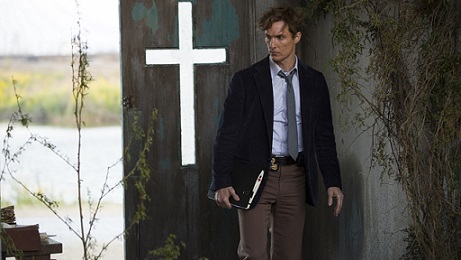Introduction
Arthur Schopenhauer’s philosophy, which Samuel Beckett defined as “an intellectual justification of unhappiness – the greatest that has ever been attempted” (Büttner 2002: 115), has perhaps had a more profound and long-lasting influence on artists than on philosophers. Even though his thought played an extremely important role in the development of the works of Friedrich Nietzsche and Ludwig Wittgenstein, his philosophy seems to have found and still find more resonance with the minds of those working in the fields of the arts: Wagner, Mahler, Richard Strauss, Dvorák, Schönberg, Tolstoy, Turgenev, Zola, Maupassant, Proust, Hardy, Conrad, Thomas Mann, Gide, Lawrence, Gissing, Huysmans, Borges, Beckett, Thomas, Maeterlinck, Houellebecq, Hermans and Reve, for example, all expressed affinity with his deeply pessimistic ideas.
In this brief article, I want to show that the influence of Schopenhauer’s ideas is not limited to the fields of painting, sculpture, architecture, literature or poetry, but has even expanded to the medium of television. I will do this by focusing on the ways in which his philosophy returns in HBO’s recent hit series True Detective, of which a first season appeared in the first half of 2014.
TV series are playing a more and more important role in the contemporary landscape of popular media. Unlike movies, which are generally about 90 to 120 minutes long, the format of TV series allows the telling of complicated storylines and the development of intriguing and profound characters. They make it possible to create convincing arcs during which characters undergo psychological changes or develop insights into the political, social, cultural or religious structures that define their existence, sometimes affirming these structures, sometimes undermining them. Examples are shows as diverse as Heimat, Berlin Alexanderplatz, The Sopranos, Homeland, Six Feet Under, Breaking Bad, Sons of Anarchy, Treme, House of Cards, The West Wing and The Wire.
But the length of TV shows also enables directors to profoundly and carefully build up an atmosphere. One of the best examples is David Lynch’s surrealist cult series Twin Peaks, which tells the story of the investigation into a murder and gradually uncovers the dark and seedy secrets of the inhabitants of the small town of Twin Peaks. The series frequently wanders into metaphysical territory and delves into the notion of an ungraspable presence of good and evil forces that manifest themselves unexpectedly to the characters of the series. It thereby remains unclear if these manifestations are real or if they are mere illusions.
The unique and often ungraspable character of Twin Peaks has sparked several philosophical analyses of the series. Bert van den Brink (1997), for example, has compared the series’ style and atmosphere, together with those of the film Apocalypse Now and Bret Easton Ellis’ novel American Psycho, with the radical character of Theodor Adorno and Max Horkheimer’s analysis of enlightenment thought, as formulated in Dialectic of Enlightenment.
Similar themes are explored in HBO’s above-mentioned critically acclaimed hit series True Detective. Like Twin Peaks, True Detective depicts a brooding atmosphere that makes every explored character or situation pregnant with an aura of impending doom. Unlike Twin Peaks, which has a humorous and often campy side and parodies the story lines of soap operas, True Detective is characterized by a dark and profoundly serious tone, even though its title refers to a pulp fiction genre called “true detective.”
Hart and Cohle
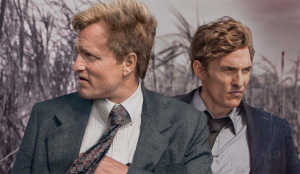 Its specific tone is partly constituted by the way True Detective is filmed. It contains beautiful shots of the Louisiana landscape in which the story takes place; desolate coastal plains and dark skies, providing every scene in the series with an apocalyptic sphere, accentuated by brooding and atmospheric music.
Its specific tone is partly constituted by the way True Detective is filmed. It contains beautiful shots of the Louisiana landscape in which the story takes place; desolate coastal plains and dark skies, providing every scene in the series with an apocalyptic sphere, accentuated by brooding and atmospheric music.
The other element that contributes to the characteristic tone of the series is found in its content; more specifically in its storyline and the dialogues between its characters. True Detective revolves around two detectives: Martin Hart (played by Woody Harrelson) and Rustin Cohle (played by Matthew McConaughey). During the eight episodes that make up True Detective’s first season, Hart and Cohle attempt to solve a gruesome ritualistic murder of a former prostitute.
Not unlike Twin Peaks, Cohle and Hart’s investigations into the case make them uncover the darker aspects of society. Not only do they visit a local evangelical revivalist church and an almost surreal range in a forest, which harbors runaway girls (some underage) as prostitutes, they also explore the contours of a mysterious cult that sacrifices children and women, worships the devil, and is linked to a child molestation ring that includes politicians and powerful religious people.
These bleak events, combined with the dark and apocalyptic landscape in which the story is set, provide the series with a constant atmosphere of ungraspable but omnipresent forces of evil. The viewer develops the feeling that these forces transcend the existence of humanity and make its goals, hopes and dreams appear as futile and naïve manifestations of an already corrupted and dying species.
These feelings are explicitly affirmed and conceptualized by detective Rustin Cohle: in long dialogues and monologues, Cohle expresses his nihilistic views on life and his philosophical observations on the dark nature of humanity. The fact that these views coincide with the horrifying nature of the crime they attempt to solve and with the secrets hidden by the people they meet, makes the series suggest that Cohle is right; that humanity is indeed lost and that all hope is gone.
Inspirations
 Cohle’s views are inspired by different literary and philosophical works and traditions, mainly of a nihilistic or pessimistic nature. In analyses of True Detective, Thomas Ligotti’s The Conspiracy Against the Human Race, Jim Crawford’s Confessions of an Antinatalist, Ray Brassier’s Nihil Unbound, Eugene Thacker’s In The Dust of This Planet and David Benatar’s Better Never to Have Been are mentioned, as well as horror writers like H.P. Lovecraft, Karl Edward Wagner and Laird Barron. Books to which the series directly refers by way of quotes and names are Ambrose Bierce’s An Inhabitant of Carcosa and Robert Camber’s The King in Yellow (see Hughes 2014; Calia 2014).
Cohle’s views are inspired by different literary and philosophical works and traditions, mainly of a nihilistic or pessimistic nature. In analyses of True Detective, Thomas Ligotti’s The Conspiracy Against the Human Race, Jim Crawford’s Confessions of an Antinatalist, Ray Brassier’s Nihil Unbound, Eugene Thacker’s In The Dust of This Planet and David Benatar’s Better Never to Have Been are mentioned, as well as horror writers like H.P. Lovecraft, Karl Edward Wagner and Laird Barron. Books to which the series directly refers by way of quotes and names are Ambrose Bierce’s An Inhabitant of Carcosa and Robert Camber’s The King in Yellow (see Hughes 2014; Calia 2014).
Cohle’s deeply pessimistic philosophy, however, is based mainly on a mixture of the ideas of Arthur Schopenhauer, Friedrich Nietzsche, Charles Darwin and Sigmund Freud. True Detective showrunner Nic Pizzolatto claimed the following in an interview:
“For people who thought Cohle’s philosophy was simply hogwash, be aware that you’re calling Arthur Schopenhauer and Friedrich Nietzsche hogwash. Just be aware of that. That is not, in fact, a college freshman stoned eating a pizza talking about life; that’s Arthur Schopenhauer’s thoughts on life.” (Quoted in Rowles 2014)
Indeed, especially the ideas of the German pessimistic philosopher Arthur Schopenhauer shine through most of Cohle’s observations and ideas.
This influence already becomes clear in the first episode of True Detective, in which Hart visits Cohle at home and notices a cross hanging on the wall of his otherwise almost completely empty apartment. When Hart asks him why, Cohle answers: “That’s a form of meditation. [—] I contemplate the moment in the garden, the idea of allowing your own crucifixion.” Arthur Schopenhauer approached Christianity in a similar manner as showing us a truth about human existence: “in the New Testament, the world is presented as a vale of tears, life as a process of purification, and the symbol of Christianity is an instrument of torture” (Schopenhauer 1969b: 584). He furthermore observed: “in its innermost core, Christianity bears the truth that suffering (the Cross) is the real purpose of life” (Schopenhauer 2000: 309).
In the same scene, Hart asks Cohle what exactly he believes. Cohle replies:
“Look. I consider myself a realist, all right, but in philosophical terms, I’m what’s called a pessimist. [—] I think human consciousness was a tragic misstep in evolution. We became too self-aware. Nature created an aspect of nature separate from itself. We are creatures that should not exist by natural law. [—] We are things that labor under the illusion of having a self, this accretion of sensory experience and feeling, programmed with total assurance that we are each somebody when, in fact, everybody’s nobody.”
Following these ideas, Cohle characterizes the world as a “giant gutter in outer space.”
Pessimism
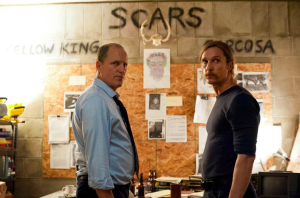 Cohle’s monologue touches on several issues that form the core of Schopenhauer’s thought. Schopenhauer developed a philosophy that revolves around the notion of a metaphysical Will that transcends the world that we perceive and in which we live. With this idea, he broke with philosophical and religious traditions that are grounded in the idea that the world is good or that it is organized rationally according to a plan or an ideal. Instead, he claimed, it consists of a blind force that makes the world into a hellish and aimless place in which each creature struggles for survival and has no control over its own fate.
Cohle’s monologue touches on several issues that form the core of Schopenhauer’s thought. Schopenhauer developed a philosophy that revolves around the notion of a metaphysical Will that transcends the world that we perceive and in which we live. With this idea, he broke with philosophical and religious traditions that are grounded in the idea that the world is good or that it is organized rationally according to a plan or an ideal. Instead, he claimed, it consists of a blind force that makes the world into a hellish and aimless place in which each creature struggles for survival and has no control over its own fate.
Influenced by the naturalistic theories that were rising in his time, Schopenhauer argued that this Will manifests itself in human beings and animals as well, and that they experience it in the form of strivings like sexual desires, the need to procreate and the drive to self-preservation. He herewith not only criticized those who claimed that there is a fundamental difference between human and non-human animals, but also observed that this situations makes our lives into endless cycles of desires and strivings, intermitted by brief moments of satisfaction that quickly turn into boredom. Famously he therefore wrote that life “swings like a pendulum to and fro between pain and boredom” (1969a: 312) and concluded:
“Awakened to life out of the night of unconsciousness, the will finds itself as an individual in an endless and boundless world, among innumerable individuals, all striving, suffering, and erring; and, as if through a troubled dream, it hurries back to the old unconsciousness. Yet till then its desires are unlimited, its claims inexhaustible, and every satisfied desire gives birth to a new one. No possible satisfaction in the world could suffice to still its craving, set a final goal to its demands, and fill the bottomless pit of its heart.” (1969b: 573)
In the third episode of True Detective, Cohle characterizes human beings, in line of Schopenhauer’s naturalism, as “biological puppets.”
A second important aspect of Schopenhauer’s metaphysics is that it suggests that we cannot change our existence: he argues that the Will completely determines our acts and that we have no rational control over that which we want or do. As rational and reflective beings, we are doomed to reflect on our own powerlessness, reduced to passive onlookers to our enslavement to an ungraspable metaphysical force.
Individuality
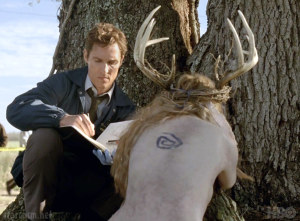 Following his metaphysics, Schopenhauer furthermore claimed that individuality is an illusion, created by an ego that does not realize that it is a mere cog in a metaphysical machine but desperately clings to the false idea that we are all separate beings with separate selves. Like Cohle, this made Schopenhauer characterize humanity as a mistake. He observes: “Death […] is the violent destruction, bursting in from outside, of the fundamental error of our true nature, the great disillusionment. At bottom, we are something that ought not to be” (1969b: 507). Schopenhauer even affirmed the Christian idea of original sin, claiming that we all in some way or another realize that we are mistakes, walking paradoxes, things that “ought not be.” Cohle agrees, observing in episode five: “Everybody wants a confession. Everybody wants some cathartic narrative for it. The guilty, especially. Oh, but everybody’s guilty…”
Following his metaphysics, Schopenhauer furthermore claimed that individuality is an illusion, created by an ego that does not realize that it is a mere cog in a metaphysical machine but desperately clings to the false idea that we are all separate beings with separate selves. Like Cohle, this made Schopenhauer characterize humanity as a mistake. He observes: “Death […] is the violent destruction, bursting in from outside, of the fundamental error of our true nature, the great disillusionment. At bottom, we are something that ought not to be” (1969b: 507). Schopenhauer even affirmed the Christian idea of original sin, claiming that we all in some way or another realize that we are mistakes, walking paradoxes, things that “ought not be.” Cohle agrees, observing in episode five: “Everybody wants a confession. Everybody wants some cathartic narrative for it. The guilty, especially. Oh, but everybody’s guilty…”
Based on his metaphysical system, Schopenhauer agreed with the mystical ideas he found in Eastern religious texts, according to which life is a dream or an illusion, made up by a self that essentially is just a mere manifestation of an ungraspable metaphysical force: “This world that appears to the senses has no true being, but only a ceaseless becoming; it is, and it is also not; and its comprehension is not so much a knowledge as an illusion” (1969a: 419). In the third episode of True Detective, Cohle follows Schopenhauer and claims that people who die arrive at the following realization:
“That you, yourself, this whole, big drama, it was never anything but a jerry-rig of presumption and dumb will. And you could just let go. Finally know that you didn’t have to hold on so tight. To realize that in all your life, all your love, all your hate, all your memory, all your pain, it was all the same thing. It was all the same dream, a dream that you had inside a locked room. A dream about being a person.”
Self-denial
 Based on these bleak observations, Cohle suggests the following: “I think the honorable thing for our species to do is deny our programming, stop reproducing, walk hand in hand into extinction.” Again, this idea famously returns in Schopenhauer’s philosophy: The World as Will and Representation ends with an almost therapeutic discussion of ways to live in this world of suffering as a manifestation of endless striving. Inspired by religious ideas and his reading of the Vedas and Vedantas, Schopenhauer argues that salvation can be found once an individual human being intuitively grasps the idea that the self is an illusion. This can result in a denial of the Will inside him- or herself and quietens down the endless strivings that overcome him or her. In this context, Schopenhauer discusses the practice of ascetism but also aesthetic contemplation. Only a complete denial of everything that we are, he suggests, may enable us to break free from the metaphysical machine that we are part of.
Based on these bleak observations, Cohle suggests the following: “I think the honorable thing for our species to do is deny our programming, stop reproducing, walk hand in hand into extinction.” Again, this idea famously returns in Schopenhauer’s philosophy: The World as Will and Representation ends with an almost therapeutic discussion of ways to live in this world of suffering as a manifestation of endless striving. Inspired by religious ideas and his reading of the Vedas and Vedantas, Schopenhauer argues that salvation can be found once an individual human being intuitively grasps the idea that the self is an illusion. This can result in a denial of the Will inside him- or herself and quietens down the endless strivings that overcome him or her. In this context, Schopenhauer discusses the practice of ascetism but also aesthetic contemplation. Only a complete denial of everything that we are, he suggests, may enable us to break free from the metaphysical machine that we are part of.
To a certain extent, True Detective’s narrative and style seem to be on Cohle’s side and follow from his and Schopenhauer’s pessimism: not only is every shot in the series permeated with the atmosphere of an ungraspable presence of evil forces that seem to transcend human actions and ideas, both Cohle and Hart’s personal lives do not contain much hope either. Whereas Cohle has lost his daughter and marriage, Hart slowly destroys his own seemingly happy marriage by having an affair with a much younger girl. Like Schopenhauer’s works, the series hereby mostly affirms the idea that human relationships are doomed to fail, that true intimacy is an illusion, and that we are driven by forces – sexual, metaphysical, biological, psychological – that we do not control.
The unchangeable nature of reality
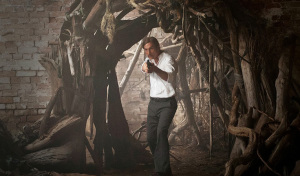 Schopenhauer’s deeply pessimistic philosophy has been criticized by many for affirming the idea that the world cannot be changed: the only thing we can do is feel compassion with those who suffer, he argues, but this suffering itself is caused by a Will that we have no control over. Since the social and cultural conditions under which people live furthermore follow from the metaphysical essence of the universe, the notion of constructing a different society or even of criticizing the conditions that shape people’s lives for the better is naïve and useless. “Everything in life proclaims that earthly happiness is destined to be frustrated, or recognized as an illusion. The grounds for this lie deep in the very nature of things” (1969b: 573), he writes, and observes: “There is only one inborn error, and that is the notion that we exist in order to be happy” (1969b: 634).
Schopenhauer’s deeply pessimistic philosophy has been criticized by many for affirming the idea that the world cannot be changed: the only thing we can do is feel compassion with those who suffer, he argues, but this suffering itself is caused by a Will that we have no control over. Since the social and cultural conditions under which people live furthermore follow from the metaphysical essence of the universe, the notion of constructing a different society or even of criticizing the conditions that shape people’s lives for the better is naïve and useless. “Everything in life proclaims that earthly happiness is destined to be frustrated, or recognized as an illusion. The grounds for this lie deep in the very nature of things” (1969b: 573), he writes, and observes: “There is only one inborn error, and that is the notion that we exist in order to be happy” (1969b: 634).
Schopenhauer furthermore argues that the Will knows no time, space or direction: it is a blind and aimless force, which means that history does not know rationality, progress or course either. It remains a manifestation of the ever-same strivings and drives that have defined and will always define human and animal behavior. Essentially, nothing changes, Schopenhauer therefore suggests: we will keep making the same mistakes.
It is therefore no surprise that especially authors within the Marxist tradition have criticized Schopenhauer’s fatalistic embrace of the unchangeable nature of the world. The Hungarian Marxist Georg Lukács and the German critical theorist Theodor W. Adorno, for example, resisted Schopenhauer’s pessimism and argued that it does not make enough room for the idea that social change is necessary and possible, and that we should develop a radical critique of the historically shaped and changeable conditions that define our existence in order to better our chances at living a healthy and happy life (see Lukacs 1980; Adornon 1973: 403).
Lukács and Adorno’s observations on Schopenhauer are interesting in the context of True Detective. Rustin Cohle seems to embrace a similar fatalism as Schopenhauer and claims in episode five: “Why should I live in history, huh? […] This is a world where nothing is solved. Someone once told me time is a flat circle, where everything we’ve ever done or will do, we’re gonna do over and over and over again.” Cohle herewith partly refers to Nietzsche’s notion of the eternal recurrence of the ever-same, which he describes in works like Thus Spoke Zarathustra and The Gay Science:
“What, if some day or night a demon were to steal after you into your loneliest loneliness and say to you: ‘This life as you now live it and have lived it, you will have to live once more and innumerable times more’ […]. Would you not throw yourself down and gnash your teeth and curse the demon who spoke thus? Or have you once experienced a tremendous moment when you would have answered him: ‘You are a god and never have I heard anything more divine.’” (Nietzsche 1974: 273)
Nietzsche saw this idea as a burden, but at the same time famously developed the idea of Amor Fati as a way of dealing with this burden: one should embrace one’s fate and not want to change any part of it, he claimed. Only this attitude would inspire greatness.
Cohle, however, implicitly rejects the notion of Amor Fati and, again, comes closer to Schopenhauer’s pessimism than to Nietzsche’s idea that knowledge about this eternal recurrence could be “divine.” In the third episode of True Detective Cohle observes:
“See, we all got what I call a life trap. A gene-deep certainty that things will be different. That you’ll move to another city and meet the people that’ll be the friends for the rest of your life, that you’ll fall in love and be fulfilled. [—] And closure. [—] Nothing’s ever fulfilled. Not until the very end. And closure. No. No, no. Nothing is ever over.”
Whereas Nietzsche claimed that one should embrace the eternal recurrence of the ever-same, Cohle agrees in this passage with Schopenhauer’s suggestion that we should deny the Will and turn away from our fate; from an existence that cannot be anything other than suffering and in which we keep making the same mistakes.
Person vs theory
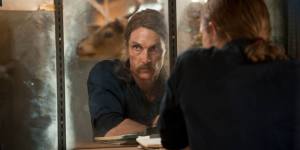 Another important point of critique formulated against Schopenhauer’s philosophy is that his ideas, in places, appear to originate mainly in his own psyche: instead of being based on carefully and theoretically constructed analyses of the world, this reading goes, his metaphysics should be understood as the way in which a deeply unhappy and frustrated soul attempted to understand and control the world in which it lived. Schopenhauer indeed had a difficult life; his father is believed to have killed himself, he had a very different relationship with his mother, and he seemed to be incapable of developing long-lasting and profound relationships with other people.
Another important point of critique formulated against Schopenhauer’s philosophy is that his ideas, in places, appear to originate mainly in his own psyche: instead of being based on carefully and theoretically constructed analyses of the world, this reading goes, his metaphysics should be understood as the way in which a deeply unhappy and frustrated soul attempted to understand and control the world in which it lived. Schopenhauer indeed had a difficult life; his father is believed to have killed himself, he had a very different relationship with his mother, and he seemed to be incapable of developing long-lasting and profound relationships with other people.
Schopenhauer’s philosophy has therefore been interpreted as a psychological defense mechanism, sparked by a suffering mind that wants to protect itself from more pain. If one believes that any attempt to change or influence the world is useless, and that unhappiness is caused by the metaphysical essence of the universe, then one might be able to make more sense of experiences like these and affirm the idea that one is, oneself, not responsible for one’s own unhappiness, this interpretation goes. This reading is explored, for example, in Irvin D. Yalom’s popular novel The Schopenhauer Cure (2005).
A similar entwinement of philosophy and personality plays an important role in True Detective. In the second episode of the series, Cohle explains that his daughter was killed in a car accident years ago when she was two years old, which resulted in the collapse of his marriage and made him completely lose himself in his job. After killing a meth addict who had injected his own child with drugs, Cohle was offered a last chance and became an undercover narcotic officer, which required him to take different drugs. His heavy drug use gave him hallucinations and before he started working with Hart on the case of the murdered girl in Louisiana, he was hospitalized in a psychiatric institution after killing three cartel members and almost getting killed himself.
During the story of the series, Cohle still experiences hallucinations, which he defines as “chemical flashbacks, neural damage.” These hallucinations are shown in the series as abstract shapes and movements in the sky, representing the ungraspable forces of evil that, in Cohle’s view, steer the world and the behavior of human beings outside of their control. “There are broader ideas at work,” he observes in the third episode.
It could be argued that these experiences and hallucinations sparked Cohle’s bleak philosophy. On the other hand, it could as well be claimed that they mainly affirmed the views on life that he already had. Cohle himself is ambivalent about this question, but seems to agree with the second idea: “sometimes I think I’m just not good for people. You know, that it’s not good for them to be around me. You know, I wear them down. You know, they… They get unhappy. [—] Well, I can’t say the job made me this way. More like me being this way made me right for the job.”
Dark and Light
 These observations about himself, however, raise an important question: why does Cohle work as a detective? If one truly believes that one cannot determine the forces that steer the world, after all, then why would one try to catch a killer and make a difference at all, however small it may be? In the first episode, Hart asks Cohle this same question: “So what’s the point in getting out of bed in the morning?” Cohle answers: “I tell myself I bear witness, but the real answer is that it’s obviously my programming. And I lack the constitution for suicide.”
These observations about himself, however, raise an important question: why does Cohle work as a detective? If one truly believes that one cannot determine the forces that steer the world, after all, then why would one try to catch a killer and make a difference at all, however small it may be? In the first episode, Hart asks Cohle this same question: “So what’s the point in getting out of bed in the morning?” Cohle answers: “I tell myself I bear witness, but the real answer is that it’s obviously my programming. And I lack the constitution for suicide.”
But this only seems to be part of Cohle’s incentive. A different answer to these questions might be found in the season’s eight and final episode, which presents the viewer with a rather uncharacteristic and surprising twist. In this finale, Cohle’s views on life undergo a radical change. We are shown how he and Hart eventually manage to catch and kill the serial killer they were looking for. During a final battle, the killer throws a hatchet into Cohle’s chest and almost kills him. Cohle gets into a coma and spends a long time in the hospital.
When he wakes up, Cohle tells Hart that while he was comatose he felt the presence of his deceased daughter and father, an experience that fundamentally changed his hitherto pitch-black views on life. He now claims that the universe is driven by a battle between dark and light and observes: “Once there was only dark. If you ask me, the light’s winning.” The season’s finale ends with these lines.
Cohle herewith radically departs from his worldview. Not only does he now claim that the universe is steered by a universal battle between forces and thereby rejects the idea that everything is merely driven by a blind force that is oblivious to human goals, concepts or actions, he also embraces the idea that dead people are in some way “present” somewhere. Furthermore, he suggests that his experience of this “presence” can function as an argument for the claim that “the light is winning.”
This change comes as a surprise to the viewer. The Cohle of before the coma, after all, would reject this experience as a psychological illusion, born in his need to make sense of the senseless death of his daughter and of the meaninglessness of life in general. He would also argue that the claim that this experience, combined with the fact that they caught the killer, somehow restores a balance in the universe and shifts this balance to the side of the “light,” is naïve and overlooks the enormous amount of senseless suffering that takes place in the world. It even overlooks the fact that they did manage to catch only one killer, and were not able to even touch the powerful child prostitution ring that manipulated him into committing his murders.
The “first” Cohle would place this idea therefore in the context of the religious narratives he characterizes in the third episode as “fairy tales” and as a cathartic “transference of fear and self-loathing to an authoritarian vessel.” He would furthermore criticize the “second” Cohle for not being realistic enough and, instead of completely turning away from the world, shutting down his self-critique and his analytical capabilities in favor of a naïve embracement of the world and the possibility of it being good after all.
To a certain extent, the fundamental change in Cohle’s worldview reminds us of Schopenhauer’s discussion of the above-mentioned process of self-denial. Schopenhauer compares this process to what in certain religions is called “grace” and argues that it may result in a completely different kind of existence:
“In consequence of such an effect of grace, man’s whole inner nature is fundamentally changed and reversed, so that he no longer wills anything of all that he previously willed so intensely; thus a new man, so to speak, actually takes the place of the old. For this reason, the Church calls this consequence of the effect of grace new birth or regeneration.” (1969b: 404, emphasis from the original)
However, Schopenhauer here merely refers to a change in the subject, to a quieting down of all impulses and desires accompanies by a different state of consciousness. Unlike Cohle, he does not claim that this change suggests that the world in which we live and act is good after all. It merely implies that, in essence, everything we think we are and do is an illusion and that grace can be found once we arrive at this knowledge and turn away from the ways of the world and our own existence.
Between optimism and pessimism
It is therefore up to the series’ viewers to judge the finale of True Detective’s first season. To a certain extent, this fundamental change in tone feels like an attempt to provide the series with a happy ending, instead of with a depressing and dark conclusion. However, this change could also be understood as a way to criticize the all-encompassing pessimism of Schopenhauer and to show that it actually is possible to change the world for the better, however small this change might be.
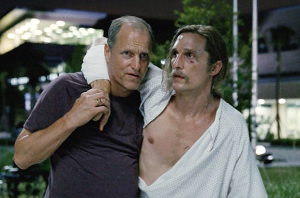 It is furthermore important to keep in mind that the story itself seems to prove the “later” Cohle wrong: the fact that the criminal organization that they were after is not even touched by them, and that they have only caught one particular person, seems to support Cohle’s “early” philosophy instead of his “later one”: true evil is not caught, and we remain trapped in a cycle in which nothing fundamentally changes.
It is furthermore important to keep in mind that the story itself seems to prove the “later” Cohle wrong: the fact that the criminal organization that they were after is not even touched by them, and that they have only caught one particular person, seems to support Cohle’s “early” philosophy instead of his “later one”: true evil is not caught, and we remain trapped in a cycle in which nothing fundamentally changes.
Whichever conclusion one might draw, True Detective forms a profound and fascinating meditation on pessimistic worldviews, on the process of mourning, and on the ways in which our psyches might influence the world we perceive and our ideas about its underlying nature. The series furthermore shows that the philosophy of Arthur Schopenhauer can form a fruitful inspiration for artistic expressions, even in the twenty-first century, and even regarding such a modern medium as a television series.
Mathijs Peters studied philosophy in Utrecht, New York and Paris, and completed his PhD at the University of Essex. He recently published a book about the reflections of Arthur Schopenhauer and Theodor W. Adorno on bodily suffering, and is interested in Critical Theory, German Idealism, phenomenology and the connections between philosophy and popular culture.
References
Adorno, Th. W. (1973), Negative Dialectics, New York: Continuum.
Brink, B. van den (1997), “Gesellschaftstheorie und Übertreibungskunst (Für eine alternative Lesart der ‘Dialektik der Aufklärung,’” Neue Rundschau, no. 108, pp. 37-59.
Büttner, G. (2002), “Schopenhauer’s Recommendations to Beckett” in A. Moorjani and C. Veit (eds.), Samuel Beckett Today/Aujourd’hui, Amsterdam and New York: Editions Rodopi.
Calia, M. (2014), “The Most Shocking Thing About HBO’s ‘True Detective’”, The Wall Street Journal, 30 January.
Hughes, M.M. (2014), “The One Literary Reference You Must Know to Appreciate True Detective”, io9, 14 February.
Lukács, G. (1980), “The Bourgeois Irrationalism of Schopenhauer’s Metaphysics” in M. Fox (ed.), Schopenhauer: His Philosophical Achievement, Sussex: The Harvester Press.
Nietzsche, F. (1974), The Gay Science, New York: Random House.
Rowles, D. (2014), “Nic Pizzolatto Teases Season Two of ‘True Detective’”, Pajiba, 10 March.
Schopenhauer A. (1969a), The World as Will and Representation, Volume I, New York: Dover Publications.
__ (1969b), The World as Will and Representation, Volume II, New York: Dover Publications.
__ (2000), “On Suicide” in Parerga and Paralipomena, Volume II, Oxford: Clarendon Press.

